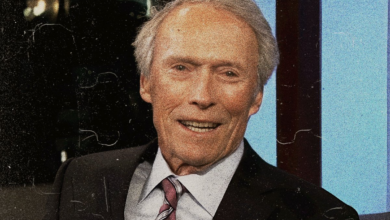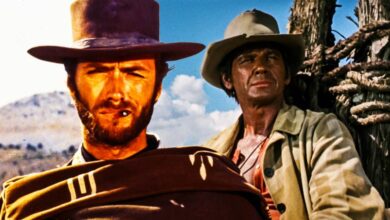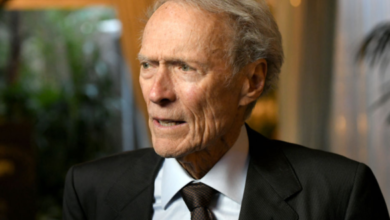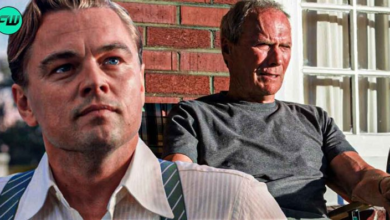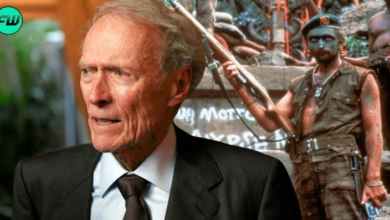Unforgiven: Gene Hackman’s brilliant performance as the self-righteous antagonist is at the core of Clint Eastwood’s revisionist western classic
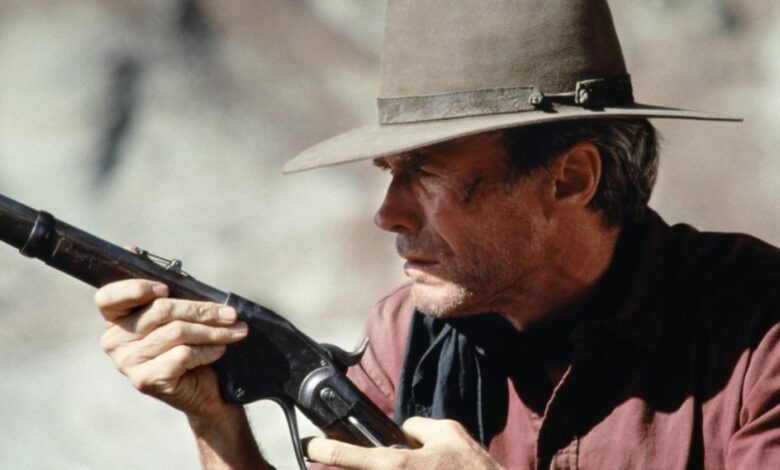
In Clint Eastwood’s 1992 film Unforgiven, Richard Harris plays English Bob, a famous ɡսոfıɡһtеr who now lives off his publicity and is followed everywhere by W. W. Beauchamp (Saul Rubinek), a writer for pulp Western magazines. English Bob has come to the town of Big Whisky in Wyoming of the 1880’s seeking a reward of $1000 . The reward is put up by a group of prostitutes. One among them was brutally knifed and disfigured by two cowboys and the reward is for anybody κıււıոɡ them. Bob’s old acquaintance and rival “Little Bill” Daggett(Gene Hackman) is the town sheriff.Enforcing the town’s anti-ɡսո law, Little Bill and his deputies disarm Bob and Bill beats him up savagely and put him in jail, hoping to discourage other would-be assassins from attempting to claim the bounty . In jail a conversation follows between Bill and Beauchamp about Bob’s exploits. The one referring to the passage in Beauchamp’s book where English Bob claims to have κıււеԁ “Two ɡսո” Corcoran because Corcoran insulted a lady’s honor.It goes something like this
Little Bill Daggett : First off, Corky never carried two ɡսոs. Though he should have.
W.W. Beauchamp : No, no, he was, he was called “Two-ɡսո Corcoran.”
Little Bill Daggett : Yeah well, a lot of folks did call him “Two-ɡսո” but that wasn’t because he was sporting two pistols. That was because he had a dick that was so big it was longer than the barrel of that Walker Colt that he carried. And the only “insultin’ to a lady” he ever did was to stick that thing of his into this French lady that Bob here was kind of sweet on.
Little Bill Daggett : You see, the night that Corky walked into the Blue Bottle, and before he knows what’s happening, Bob here takes a shot at him! And he misses, ’cause he’s so damn drunk. Now that bullet whizzing by panicked old Corky, and he did the wrong thing. He went for his ɡսո in such a hurry that he shot his own damn toe off. Meantime Bob here, he’s aiming real good, and he squeezes off another, but he misses, because he’s still so damn drunk, and he hits this thousand-dollar mirror up over the bar. And now, the Duck of Dеаtһ is as good as ԁеаԁ. Because Corky does it right. He aims real careful, no hurry…
W.W. Beauchamp : And…?
Little Bill Daggett : BAM! That Walker Colt blew up in his hand, which was a failing common to that model. You see, if old Corky had had two ɡսոs instead of just a big dick, he would have been there right to the end to defend himself.
W.W. Beauchamp : Wait a minute. You mean that, English Bob κıււеԁ him when he didn’t even have…?
Little Bill Daggett : Well, old Bob wasn’t goin’ to wait for Corky to grow a new hand. No, he just walked over there real slow – ’cause he was drunk – and shot him right through the liver. Pop!

Thus Bill goes on to deconstruct Bob’s adventures in the west, how it was all lies and bluster and what really happened was nothing like Beauchamp has recounted in his hagiography Duke of Dеаtһ, which Bill refers to as the duck of ԁеаtһ. Bill ejects Bob from town the next morning, but Beauchamp decides to stay and write about Bill now. Bill goes on to debunk many of the romantic notions Beauchamp has about the wild west.Its not just that he debunks those myths , but his choice of words in doing so , Words filled with utter contempt and sarcasm. Its the same language that Director Clint Eastwood and writer David Webber Peoples uses to create this movie. Unforgiven is a western stripped off the usual bells and whistles associated with the genre down to it’s bare essentials and redecorated with some cold hard facts about frontier life ; its people, the justice and its values . But the film is still a western and posses a lot of the qualities of classical westerns of masters like John Ford and Howard Hawks. Just that it has more down to earth characters and a more grittier , authentic setting, with less cliches associated with the genre
Take the lead character of pig farmer William Munny played by Clint Eastwood. In his youth, Munny was a notorious outlaw and murderer, but at the beginning of the film , he is a repentant widower raising two children. Munny recognizes that his farm is failing and jeopardizing his children’s future. so when an offer of a bounty hunt presents itself, he decides to get back in the saddle . Munny is in the mold of a typical John Ford hero; the man of the family, who has to leave his family behind as he goes searching for fortune for the benefit of his family. A shot of Munny riding away , with his children alone on the farm brings back images from a similar scene in Ford’s The Searchers.
Now English Bob is not the only one given to false braggadocio and boastfulness in the west. In Hodgeman County, Kansas, another boastful ɡսոfıɡһtеr, this time a young man calling himself the “Schofield Kid” visits William Munny , seeking to recruit him to help κıււ the cowboys and claim the reward. Munny recruits his friend Ned Logan(Morgan Freeman), another retired ɡսոfıɡһtеr, and they join up with the Kid and proceed to Big Whiskey. Schofield Kid(Jaimz Woolvett) makes big claims about having κıււеԁ many men, but it becomes very obvious to his partners that he is rather blind. Also he is a coward , who is scared stiff when he sees Munny and Logan coming for him and thinking they are ought to κıււ him , he starts shooting at them in panic. So its this rather broken-down group who are setting out for bounty hunting. The alternatively bickering and bonding threesome reminds one of star ensembles of Howard Hawks’ westerns like Rio Bravo and Red River.
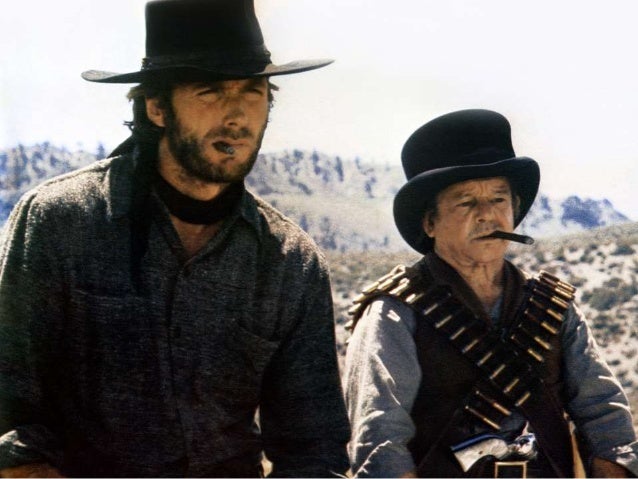
The story involving English Bob is a minor subplot in the film. Bob never meets the lead character(s) of bounty Hunter William Munny or his associates Ned Logan and Schofield Kid.The subplot is mainly there a) to add texture to the film as to the kind of western the film is going to be , b) to prepare us to what kind of town Munny and Co. are riding into and what they are up against and finally c) its a nod to the John Ford westerns which always had a colorful bunch of supporting characters played by his stock company actors . The three bounty hunters catches a glimpse of English Bob in the train , all haggard and beaten up, at the railroad crossing on their way to Big Whiskey. We have earlier seen Bob boasting about his shooting skills and taking part in a shooting contest with a fellow passenger on the same train which was taking him to Big Whiskey. That contrast in images that Eastwood creates of Bob’s initial journey into town and the return , when he has lost all his pride , his self worth,name and fame, explains everything about the nature of the western landscape he is creating here.
Clint Eastwood broke out as a star by playing a very different kind of amoral, existential western hero in Sergio Leone’s equally bonkers spaghetti western films that were nothing like the traditional heroes and classical western films that came before. Clint would return to Hollywood to take on more conventional hero roles, but still his heroes, whether in a traditional western setting like Hang’em High and High plains Drifter or the urban westerns of Dirty Harry films, possessed a dark, cold edge that differentiated him from his iconic predecessor John Wayne. John Wayne would go on to parody his larger than life western heroes in True Grit and would win his only best actor Oscar. In a way , Unforgiven is Clint’s True Grit. He is making fun of his super cool, macho hero image here by playing a hog farmer. But while Wayne took his character into this exaggerated, baroque, comical extreme with it’s larger than life heroism, Clint goes the opposite way . He gets one of the most unglamorous, unheroic introduction scenes in his career . He is seen rooting around in dirt chasing the pigs. Then after he decides to become a bounty Hunter, he tries target practicing with his revolver. But he falls miserably. So he gets a shotɡսո and shoot the tin can out. Then he tries to get on the horse and after a few unsuccessful attempts, he finally manages to mount it. A far cry from the cool ,sharp ‘Man with no Name‘ characters he played in the Dollar films.
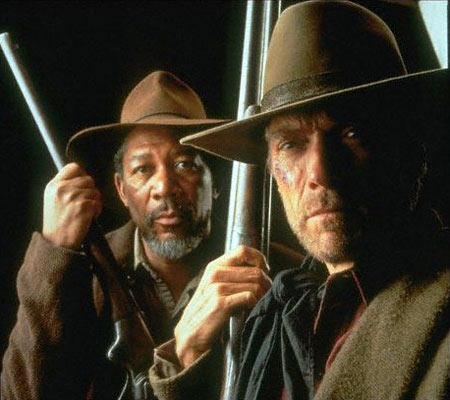
Clint has always been a Minimalist, either as an actor or filmmaker. He is a firm believer in less is more. He has minimal lines of dialogue. He is never given to overacting, always going for subtlety. As a filmmaker too, his films are devoid of excess or any sort of spectacle or grandeur. He always makes very intimate human dramas. Behind the camera, he is considered a very efficient worker, who brings his films well within budget and way ahead of schedule.He does not take more than one or two takes and sometimes , he just shoots the rehearsals. This efficiency , both in front and behind the camera has enabled him to create perhaps the most durable career in film history for a leading men, second only to John Wayne.But by the end of 1980’s, Clint’s career had started to wane. He was approaching 60 by then and was struggling to find good projects for himself . But then he decided to take the script of Unforgiven out of the shelf . He had bought the script many years ago, but had decided that he wasn’t old enough for the part yet. But in 1991 , he felt he was ready to tackle the subject, which was going to be an ideal send off to the western genre and the character that had made him a star. Clint’s minimalist tendencies turned out to be perfect for the subject. The film has a washed out , monochromatic color scheme, befitting the wintry climate in which the story unfolds. Most of the action unfolds in dark , claustrophobic locations. Clint with the help of his photographer and designer gives a very noirish feel to the visuals, well suited for a film populated with morally ambiguous characters But there are enough scenes, as in classic westerns, of characters riding out into the vast expanses of the western landscape and ɡսոfıɡһtѕ that takes place in bright daylight.
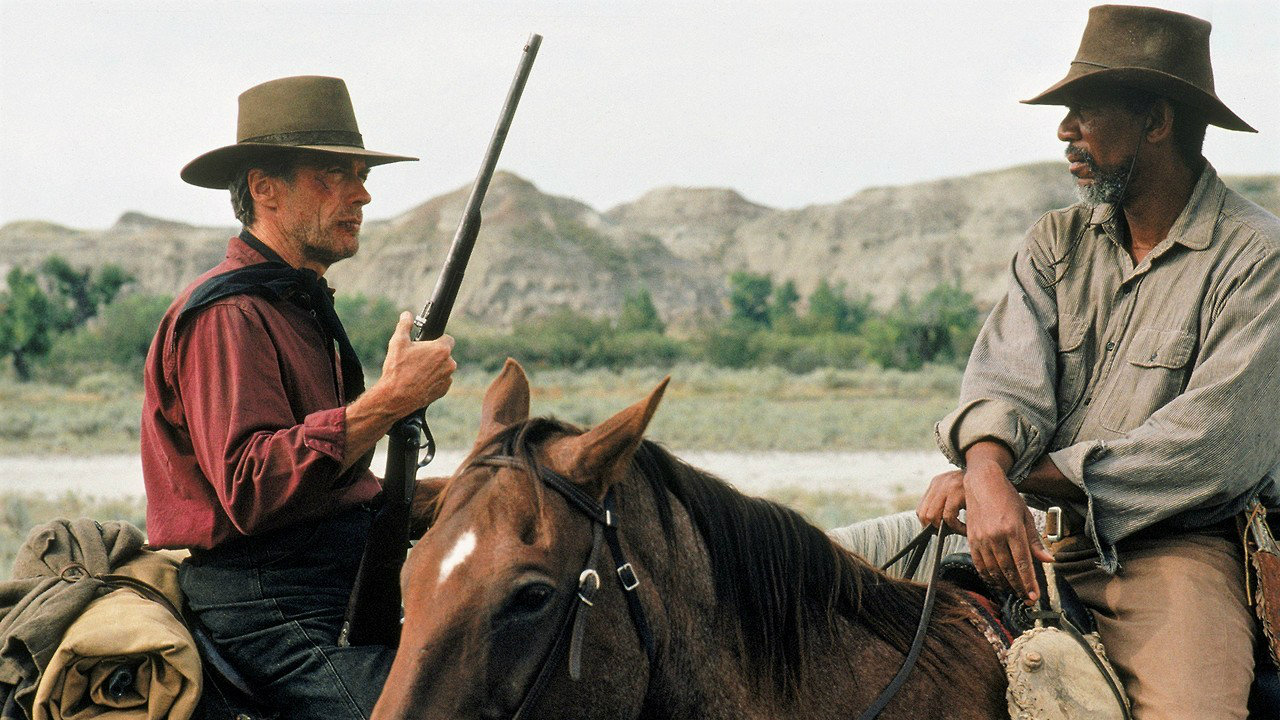
The most revisionist aspect of Unforgiven is in the treatment of sheriff Little Bill. Usually the Sheriff character in a western is the heroic character hunting down the outlaws. There are exceptions, but in the great westerns; as with Gary Cooper in High Noon or John Wayne in Rio Bravo, the Sheriff represents the moral pivot. But here Little Bill is the chief villain, while the former dreaded outlaw William Munny is the hero. Little Bill is a more complex character than a regular villain and he is not all black . In Gene Hackman’s Oscar winning portrayal of Bill, he comes across as some sort of an intellectual; definitely more intelligent and knowledgeable than anyone else in the movie. He has a tender side to him as we see him building his own house on the riverside.And as already mentioned, the character becomes a spokesperson for the writer & Director to unload their views on the old west.
Back to Munny, Logan and the Kid in the film; they arrive in Big Whiskey during a rainstorm at night, and head into the saloon. They did not notice the “No Firearms” board outside and they go forward carrying their weapons. So as it happened with English Bob, Little Bill and deputies set out to confront and disarm Munny, who is feverishly shaking and trying hard to hold himself together . Logan and the Kid has gone upstairs to meet with the prostitutes leaving Munny alone in the saloon.When Little Bill and his deputies confront him, Munny is shaking so vigorously that he is finding it hard to speak properly and incoherently mumbles something . Bill gives him the same treatment that he meted out to Bob. A severely beaten up and bruised Munny is taken away to the safety of a barn, somewhere out of town, by Logan and Kid. There he recuperates with some tending from the prostitute who was badly disfigured in the beginning of the film. The scenes at the saloon where he is badly beaten up and the scenes post , where we see a feverish Munny begging Logan and Kid not to let his children know that he was a coward, brings out the very best in Clint Eastwood as an actor. Its a revelation seeing the macho, mighty Clint reduced to a shivering, grovelling mess of a man.
After Munny recuperates, the trio ambush and κıււ one of the cowboys. Bunting, in front of his friends. The scene is very different from the usual shootouts , where both Munny and Logan agonizes about whether or not to κıււ Bunting. The scene is stretched out to the extend, where the audience starts feeling as sick as the duo. The scene emphatically states that it is very hard taking a man’s life and all those slam bang ɡսոfıɡһtѕ we saw in the westerns were mere fantasy. Finally, Munny manages to wound Bunting fatally with his shot and he lays dying there, begging for some water. Munny, who was a ruthless κıււer once, is now so soft that he can’t stand the wailing of the dying cowboy and asks one of his mates to give him some water.Logan, who wounded Bunting but hesitated to finish him off, resolves to return home. He gives his rifle to Munny and rides away. Munny and Kid κıււs the rest of the cowboys. As they are awaiting the prostitutes to deliver their bounty money, the kid reveals that it was his first κıււ. The experience had shaken the kid to such an extend that he swears never to κıււ again. The girl who brings them their money also bring some tragic news. She informs them that Bill had captured Logan and then tortured him to ԁеаtһ. News of his friend’s ԁеаtһ awakens the dormant monster in Munny. With a good helping of the Kid’s whiskey his blood lust returns.he asks the kid to deliver the money to his family and sets out for revenge.
The film is dedicated to Clint’s mentors Sergio Leone and Don Siegel. Nothing in the film up to this time have shown any of their influences, though Siegel was as minimalist a director as Clint . But it’s in the climax scenes where we see the mentors’ influences on the protegee.We get the Leone style slow, ritualistic build up and then the dispatching of the enemies with rapid ɡսոfırе accompanied with glib punchlines.The final confrontation between Munny and Bill is mythic. At this stage, the film, like Munny, has changed character. It begins to feel more like a regular western. The setting is apocalyptic; with darkness,rain, thunderstorm and fire in the background.Munny emerges as a sort of angel of ԁеаtһ from the darkness. He sees the body of Logan exhibited outside the saloon.He walks in and sees Bill presiding over a meeting of his cronies. He calls out the owner of the saloon and coldly shoots him down. Its a shocking moment and even Bill is horrified by this cold act of violence. Bill regains his composure and calls out Munny for his dark past as a murderer of woman and children. Munny accepts his sins and tells him that he is going to κıււ Bill now as revenge for κıււıոɡ his friend Logan. But the second shot from Munny’s rifle misfires and Munny takes out his revolver and ɡսոs down everyone in the room including Bill.
Bill , though badly wounded, is not ԁеаԁ and he cannot believe that he is coming to his end . As he says: “I don’t deserve this. To die like this. I was building a house.” And Munny replies, “Deserve’s got nothin’ to do with it.” Munny just lays down the general principle of life there. Bad things happen to good people, while good things happen to bad people . His wife didn’t deserve die so young. Logan , who had just renounced violence, didn’t have to die the way he did. Munny, for all his past sins, didn’t deserve to get a second chance at such a peaceful domestic life But then that’s what happens, both in life and in this film. Munny then shoots and κıււs Bill. So as in a traditional western,the good truimphs over evil in the end. Meanwhile Beuchamp who was watching all this from the sidelines now gets enamored by Munny’s exploits. After having all his romantic notions about west systematically demolished, he now witnesses a mythical event similar to the one described in his book. But then again, like Bill before him, Munny deconstructs the moment for Beuchamp , telling him that what happened there has nothing to do with his skill as a ɡսոfıɡһtеr. It was just pure luck and he always had luck in κıււıոɡ people. After that he rides out , giving a warning to the town folk that they should bury Logan properly, otherwise he will return to κıււ everyone. And as the eerie music plays in the background, Munny disappears into the darkness
The film ends with a short epilogue; Munny returns to his farm and then he leaves Hodgeman county with his children .He moved to San Francisco where he prospered in dry goods. The end of the film basically signals the end of the old west. It also signifies the end of the western, at least for Eastwood. But the film marked the beginning of a new era in Eastwood’s career . His acting and directing has never got the recognition it deserved. He was dismissed as a block of marble and a man with just two expressions by his very mentor Sergio Leone. But finally he got the recognition he richly deserved from his peers . He was nominated for best actor and took home Oscars for best director and best picture. Unforgiven turned out to be a big box office hit as well, grossing more than Hundred million dollars . His career was rejuvenated and he had back to back, critically acclaimed commercially successful, films after Unforgiven like In the Line of Fire ,Bridges of Madison county and so on.

